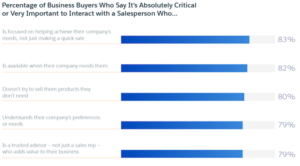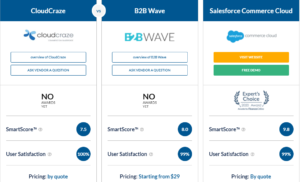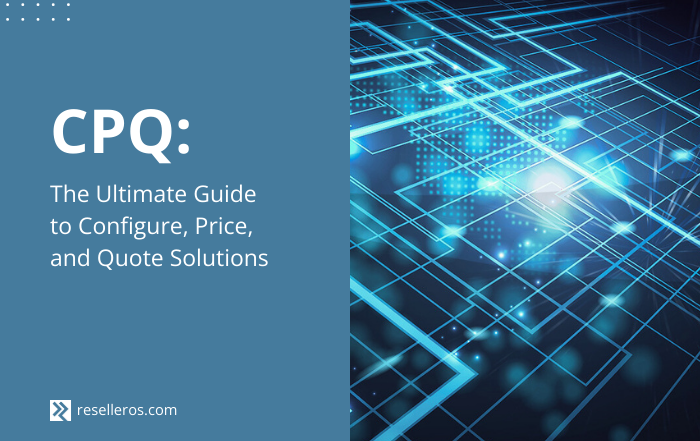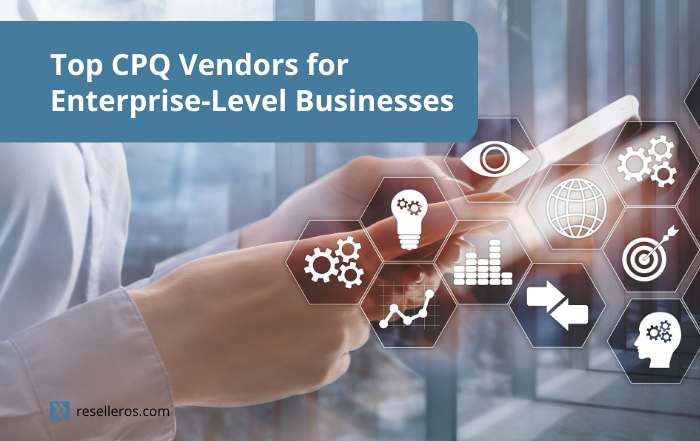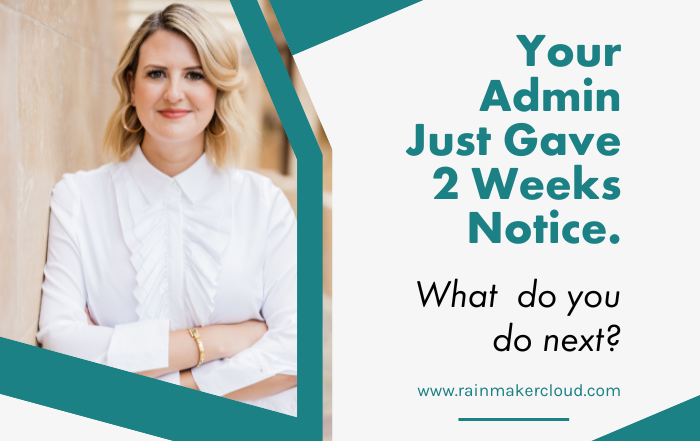How Salesforce B2B Commerce Cloud Works: The Ultimate User’s Guide
If you’re looking for a program to help manage your large-scale business transactions, then the Salesforce B2B Commerce Cloud is just what you need.
With 75% of business buyers stating that connected processes are why brands win their business, it is essential to prioritize communication between departments within your organization, which in turn ensures a seamless customer experience.
With Salesforce B2B Commerce, you can deliver an experience your customers will love. Personalize it with data-driven support, and give your team the tools they need for revenue growth.
Business buyers want to interact with sales teams who focus on helping them achieve their company’s goals – not those who are just looking to make a quick sale.
Salesforce Commerce Cloud gives your team the capacity to personalize each customer’s experience, whether your clients utilize your self-serve site or contact sales and support with questions.
What is Salesforce Commerce Cloud?
When people think of commerce, they often envision business-to-consumer (B2C) sales. However, B2B commerce requires the same functionality – only on a larger scale.
That is where Salesforce B2B Commerce Cloud comes in. Commerce Cloud allows retailers to sell online with a powerful content management system (CMS) including hundreds of out-of-the-box features that get them up and running fast.
Both B2C and B2B retailers can create exceptional online experiences for their shoppers with Commerce Cloud. The software is mobile-friendly and integrates with Service Cloud (and all Salesforce products) seamlessly. It also comes with Einstein AI-powered features.
Check out the following video for more information on Salesforce Commerce Cloud:
The Differences Between B2B and B2C Salesforce Capabilities
The primary difference between Commerce Cloud B2B and B2C is scale and scope. Business buyers often purchase thousands of items at once. Therefore, you’ll need a program that can manage those volumes without creating issues at check-out.
Retail consumers don’t buy at the volume business buyers do. That is why your B2B company needs a software solution that goes beyond standard ecommerce functionality. You need an ecommerce storefront that accommodates your business customers and their large-scale buying needs.
The Functionality of Salesforce B2B Commerce
Business buyers’ online purchasing needs differ vastly from that of retail consumers. They buy thousands of items for millions of dollars. Therefore, the functionality of your B2B ecommerce platform needs to accommodate these types of transactions.
Authenticated Sites Per User
With large-scale transactions, each visitor to your website requires their own verified login capability. These need to be secure and provide the user with the necessary authority to make the purchase.
Sizeable Shopping Cart Accommodations
Business buyers need to be able to purchase hundreds or thousands of items per order. Therefore, your ecommerce platform must process thousands of SKUs at once without slowing down the system or stalling the order.
Rapid Ordering and Reordering
Your business buyers will have consistent product lines. That means they will purchase the same items repeatedly to fulfill their own orders. Therefore, they will need to purchase (and repurchase) items frequently, with just one click.
Specific Product Catalogs
If you provide products to businesses, you will need specific products catalogs with a selected subset of products. You’ll want everything to be easy for your customers to find.
This requires dynamic products and an easy-to-use search bar that allows your customers to filter their search results based on that particular order.
Also, you will want to track order histories for each authenticated visitor. This allows you to streamline the ordering process for your customers.
Complex Shipping Functionality
Shipping is another concern for B2B ecommerce retailers. Often there will be multiple delivery dates and locations required for order fulfillment. Salesforce Commerce Cloud has the capabilities to manage these shipping complexities.
Multiple Payment Methods
Unlike B2C retail shoppers, your B2B ecommerce platform must offer multiple payment types – some of them uncommon for ecommerce – including credit or debit cards, purchase orders, and ACH transactions.
These transactions must provide the capabilities of processing large-scale purchase amounts. Salesforce B2B Commerce Cloud integrates seamlessly with your merchant service accounts to give you the payment options you need.
CloudCraze (B2B) Classic vs. Salesforce
Salesforce Commerce Cloud isn’t the only ecommerce software giant on the market. Often, retailers search for more cost-effective alternatives to Salesforce Lightning Exchange (LEX).
The cumbersome process of contrasting ecommerce software requires a base knowledge of what its competitors can do and whether the price point is worth other software limitations.
CloudCraze and B2B Wave are two competitors to LEX that some companies have considered. While neither of these competitors scored as highly in the SmartScore™, CrazeCloud has a user satisfaction rating of 100% (Salesforce and Wave have a 99% rating).
Their list of features is equally matched. However, only B2B Wave offers upfront pricing. The others are by quote only. In some cases this may be off-putting – but here, Salesforce’s lack of upfront pricing is due to the high personalization levels of the software, which can be tailored to each customer’s unique business needs.
The most predominant difference between each of these services is their corporate office locations. CloudCraze and B2B Wave are located in the United Kingdom, while Salesforce is based in San Francisco, California.
Salesforce Commerce Cloud for B2B Sales Transactions
The internet is a vast place, and ecommerce has been making its mark. Consumers want an easy way to buy things online with the help of companies they can trust. This is true whether it’s for personal use or business purposes.
The Salesforce Commerce Cloud provides the tools that B2B and B2C merchants need, so that both types of sellers have complete control over their digital experiences – from managing inventory to shipping orders – all while offering seamless transitions between different channels like mobile shopping apps and website browsing.
Rainmaker offers Salesforce Managed Services to help you facilitate the Salesforce journey and maximize your ROI. Experienced and friendly professionals will help your organization deliver positive customer outcomes in your Salesforce B2B Commerce platform.
Implement a Salesforce B2B Commerce Cloud strategy today. Contact us here at Rainmaker to learn how.

